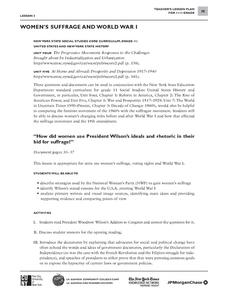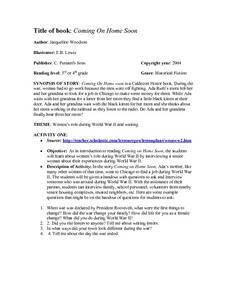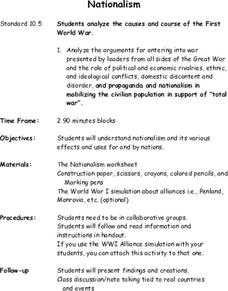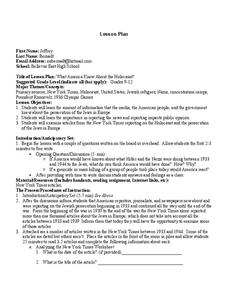Curated OER
The Cold War: Solving the Mystery of History with Voices on Vinyl
Eighth graders explore the Cold War Era. In this world history lesson, 8th graders discover the positions taken by countries during the Cold War as they listen to lectures regarding the major events and turning points in the Cold War....
City University of New York
Woman's Suffrage and World War I
How did women use President Wilson's ideals and rhetoric in their bid for suffrage? To answer this essential question, class groups analyze primary written documents and visual images.
National WWII Museum
“My Dear Little Boys…” Interpreting a letter home from the war
Letters have long been prized by historians as primary sources for what they reveal not only about events but also about the emotional responses of the writers to these events. "My Dear Little Boys," a letter written by Leonard Isacks on...
US National Archives
WWII: Mediterranean and N. Africa 1939-45 – Monty
Is Field Marshal Montgomery the right man to command the land forces in France for D-Day? That's the question facing young historians as they explore an interactive resource that focuses on the Mediterranean and North Africa theatre from...
US Institute of Peace
Perspectives on Peace
Is peace simply the absence of war, or is there more to the story? Young social scientists define peace in the second installment of a 15-part series. Groups work together to explore cultural concepts of peace and the peacemaking process...
Curated OER
Communities in Crisis Lesson 1: Primary Source? What is That?
Distinguish between primary and secondary source documents using the theme of philanthropy. Middle schoolers discuss Anne Frank: The Diary of Young Girl as a way to study the past using a primary source. Then they investigate how to...
Maryland Department of Education
The Concept of Identity Lesson 2: The Historical/Biographical Approach
"How does our environment shape our identity?" After researching biographical information about John Knowles and considering how these experiences are reflected in A Separate Peace, class members consider the strengths and weaknesses of...
Curated OER
WWI Through the Film, Foot Soldiers
If your historians are watching the History Channel documentary, Foot Soldiers during their WWI unit, this plan has some simple recall questions and one referential/debate question ("What was the worst part of the war?") to ask after...
Curated OER
ZIP: A One-Act Play
High schoolers review amendments of the Constitution relating to due process. They discuss the Constitution in the case of Eberhard "Zip" Fuhr. They research the provisions of the WWII Alien Enemy Control Program. They determine how...
Curated OER
Black Alabamians in World War I
Eleventh graders describe the racial climate of Alabama, then discuss some of the war-related concerns of black and white Alabamians.
PBS
Historical Perspectives: Coming Home from War
What do the homecoming experiences of soldiers who fought in WWII, Vietnam, Iraq, and Afghanistan reveal about the politics and culture of the US during the time period of each war? Young historians view The Way We Get By, which tells...
Curated OER
The Internment of Ukrainians in Canada
Young scholars examine the condition of Ukrainian internment in Canada during World War I. In this World War I lesson, students research selected Internet sources to compare and contrast the internment of Ukrainians in Canada during...
Curated OER
Coming On Home Soon
Learners explore the role of women during World War II. Through a reading of the book "Coming On Home Soon" students gain insight into the ways women helped the war effort. Research and writing activities help support their point of...
Curated OER
Map Studies
Students analyze maps of Europe, and research and discuss current wars in Europe, and compare them to World War I and World War II.
Curated OER
American Homefront
Seventh graders explore what life was like on the Homefront for Americans during World War II. They evaluate propaganda posters that were created during World War II. Students draw pictures depicting life on the American Homefront during...
Curated OER
Iwo Jima: Forgotten Valor
Students explore the nature of island combat on Iwo Jima during World War II. They examine the association between the Pacific Theater of World War II and Iwo Jima. Students evaluate Charles Lindberg's oral history, propaganda posters,...
Curated OER
Europe Before and after WWI
Eighth graders compare and contrast maps of Europe before and after World War I. In this World War I lesson, 8th graders color and label maps of Europe prior to the war and after it. The historical maps can be accessed online.
Curated OER
Eyewitness to History W.W.I.
Eleventh graders take a closer look at the weapons used to fight World War I. In this World War I lesson plan, 11th graders complete a reading assignment, discuss it, and form research groups. Students work in the groups to...
Curated OER
Nationalism
Tenth graders examine the causes and course of World War I. They read and discuss a handout, simulate the formation of a country, design a flag, develop a national slogan, and present their country's information to the class.
Curated OER
The Advantages and Disadvantages of the Treaty of Versailles
Students identify the advantages and disadvantages of the Treaty of Versailles. Using the text of the treaty, they discover it created more tension between groups then bringing peace to the region. They discuss how this treaty could have...
Curated OER
Fighting for Democracy, Fighting for Me
Students explore the contributions of African Americans, Japanese Americans, and Mexican Americans in World War II. In this World War II lesson, students research Internet and print sources regarding the treatment of the ethnic groups...
Curated OER
What America Knew About the Holocaust?
Students examine American involvement in World War II. For this World War II lesson, students discuss the Holocaust and its implications. Students read New York Times articles regarding the treatment of Jews during the war. Students...
Curated OER
Christmas in the Trenches, 1914
Learners investigate the role of Trench Warfare in World War I. In this World War I lesson, students read Christmas in the Trenches, 1914 and then discuss the conditions of war in trenches and how Christmas 1914 interrupted the war....
Spark Notes
The Interwar Years (1919-1938): Study Questions
In this online interactive history worksheet, students respond to 10 short answer and essay questions about years between World Wars I and II.

























